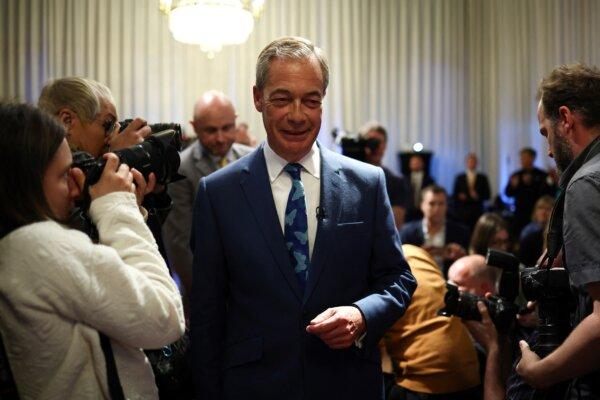Analysts say a rightward shift reflects disillusionment with mainstream parties, anti-mass immigration sentiment, and a backlash against ‘woke’ policies.
News Analysis
When Trump returns to office on Jan. 20, he will face a much-changed political landscape in Europe, where countries including France, Germany, Austria, and Sweden have shifted toward right-wing parties and policies.
With polling in many nations suggesting an accompanying shift in younger generations, many political analysts and pollsters believe this trend is set to continue well into the second Trump presidency.
Progressives, Centrists
When Trump first entered the White House in January 2017 Europe’s political landscape was dominated by centrist and progressive leaders.
France was led by President François Hollande, a member of the Socialist Party; Chancellor Angela Merkel, leader of the center-right Christian Democratic Union (CDU), was serving her third term in Germany; and Sweden’s Prime Minister Stefan Löfven, head of the Social Democrats, had been in power since 2014.
Italy was governed by a center-left coalition led by Paolo Gentiloni, a member of the social democratic political party Democratic Party (Partito Democratico).
Spain was ran by Mariano Rajoy, the leader of the People’s Party (Partido Popular, PP), a center-right political party, however, Rajoy was ousted by Pedro Sánchez, the leader of the Spanish Socialist Workers’ Party in 2018 after he lost a no-confidence vote.
Attitudes
Although attitudes towards immigration were generally liberal, they had begun to shift.
In a 2016 European Union report, the EU said that immigration of people from non-EU countries evoked a “negative feeling” for a clear majority of Europeans in 24 member states.
A year earlier, the 2015 European migrant crisis took place, a period of significantly increased movement of refugees and migrants into Europe, namely from the Middle East.
Merkel in 2015 accepted more than a million Syrian refugees into Germany.
Bucking the trend at the time, the UK with its conservative and liberal democrat coalition government under Tory PM David Cameron, refused in 2015 to accept any further refugees from the Middle East. Cameron also called a referendum in 2016 which resulted in the UK leaving the European Union, known as Brexit, though as a key part of the Remain camp, he subsequently resigned in 2016.
2025: Populists and Change
Eight years on, the Overton window has shifted Trump’s way. In Europe, Trump will find few of the familiar centrists and socialists he battled with in his first presidency.
Last year, The European Council on Foreign Relations predicted that 2024 European Parliament elections would see saw a major shift to the right in many countries, with populist right-wing parties gaining votes and seats across the EU, and center-left and green parties losing votes and seats.
The trend in Western Europe also suggested that the taboo of voting for populist, anti-immigration parties is fading.
Under the leader of the right-wing Brothers of Italy party and Prime Minister Giorgia Meloni, Italy has prevented the flow of migrants crossing the Mediterranean by implementing a program that diverts migrants to Albania while asylum claims are processed. The program is the first of its kind operated by a European Union nation.
Meloni has also banned the production and use of lab-manufactured food to preserve Italian food heritage and has criminalized Italians from seeking a surrogate mother abroad.

The populist Elon Musk-backed Alternative for Germany (AfD), which made an unprecedented breakthrough in state elections last November, is now hoping, as second place in the polls, to make gains in national elections next month.
The right-wing anti-immigration and euroskeptic Freedom Party, led by Herbert Kickl, won the country’s parliamentary election last September, taking 28.8 percent of the vote, knocking Chancellor Karl Nehammer’s conservative Austrian People’s Party into second place. Kickl is currently being tasked with forming a new government.
France’s National Rally performed beyond expectations in the European election last June, garnering 31.5 percent of the votes cast, prompting centrist President Emmanuel Macron to call a snap election, a decision he has expressed regret over.
The veteran Dutch politician Geert Wilders and his Freedom party doubled its seats in the Netherlands parliament in 2023 and is currently part of a coalition. Wilders, a right-wing populist widely known for his anti-Islam views, has pledged to curb “the asylum tsunami” and immigration to the Netherlands.
Due to the influence of The Sweden Democrats, the largest member of Sweden’s right-wing bloc and now the second-largest party in the Riksdag, Sweden has radically tightened its once-liberal migration policies. The country has taken in vast numbers of immigrants over the past two decades, which the government says has led to parallel societies and gang violence.
According to the Spanish polling company 40dB, in Spain, right-wing parties Partido Popular, Vox, and SALF are snapping at the heels of Prime Minister Pedro Sanchez’s ruling socialist PSOE.
There have also been right-wing triumphs in Romania, albeit short-lived. Romania’s top court annulled the first round of the country’s presidential election, which was won by a populist, Calin Georgescu, who campaigned largely on TikTok.
EU officials issued a “retention order” under the Digital Services Act after declassified documents showed Georgescu had been promoted on TikTok through a series of coordinated accounts, recommendation algorithms, and paid promotion.

The UK, with a democratic socialist government under Labour, is again bucking the current trend. However, Brexit campaigner and Trump ally Nigel Farage’s right-wing Reform UK is riding high in the polls. YouGov polling from Jan. 14 showed that if a general election were held tomorrow, 26 percent of British voters would choose Labour and 25 percent would vote Reform UK.
In a November speech, UK Prime Minister Keir Starmer accused conservative governments before him of conducting an experiment with open borders and allowing record-high migration.
“This happened by design, not accident. Policies were reformed, deliberately, to liberalize immigration. Brexit was used for that purpose to turn Britain into a one-nation experiment in open borders,” said Starmer.
‘Antithetical to Our Way of Life’
Frank Furedi, the executive director of MCC Brussels and a sociologist, told The Epoch Times that voters are turning their backs on the established order, putting mainstream conservative and centrist left-wing parties on the defensive.
“And this has created a space for parties to basically say that, look, ’the problem is not only that these parties have not represented us, they’ve agreed and promoted policies that are antithetical to our way of life,’” he said.
Furedi noted that populism is on the rise across Europe, even in Portugal, which has been one of the few countries to resist a significant right-wing shift. He added that many people now believe it’s time to embrace new political alternatives.
He also pointed out a shift among younger generations, who once leaned left, are increasingly now aligning with right-wing movements.
According to an exit poll by the polling company Infratest dimap in June, support for Germany’s AfD was up 11 percentage points to 16 percent among under-25-year-olds, more than double the 5-point rise among the broader population.
In France, National Rally took a 25 percent share of the vote among 18–24-year-olds, according to pollster Ipsos in June.
Furedi said that what unites all of these different parties is the sense that “somebody or something has pulled a carpet under their feet and their way of life has sort of been called into question.”
Furedi added that many people feel alienated by the language and policies promoted by the political elites, policies that often make them feel disrespected. He cited mass migration as a key issue, which challenges national cultural identities.
“For very long time, that you couldn’t be a patriot or feel a strong sense of identity with your nation, the flag, because it was suggested that that’s somehow wrong and it’s xenophobic, whereas other people want to feel that their identity, as Spaniards or as Germans or anybody else, is worthwhile,” he said.

Anti-Woke
Professor of Politics at The University of Buckingham and Director of the Centre for Heterodox Social Science, Eric Kaufmann told The Epoch Times that attitudes to “woke” policies are key drivers to populist movement.
Kaufmann recently wrote the book “Taboo: How Making Race Sacred Produced a Cultural Revolution” and has previously called “cultural socialism” a religious form of wokeness and an ideology has taken precedence over free speech, due process, equal treatment, and other Enlightenment values.
“My view is that populism on the right comes from the same underlying drivers as the populist moment of 2014–16, namely immigration and ethnic change,” said Kaufmann.
“But anti-woke is a compounding factor,” he added.
He said that he didn’t believe that the data show that net-zero climate goals are much of a significant factor for most populist voters, though it is important for populist elites.
“In reaction to the populist surge of 2014–16 we got the cultural left deplorables/‘racist’ pushback narrative, which contributed to the cultural madness of the Great Awokening of 2013/14–2022,” he said.
He said that this produced the “moral panic” of Black Lives Matter in 2020 and the excesses of the MeToo movement, along with cancel culture and a focus on diversity, equity, and inclusion (DEI).
He said that “the cultural left is on the ropes in the U.S., a bit less so in Europe.”
“But the direction of travel in both places (don’t forget Canada) is anti-woke and anti-immigration,” said Kaufmann, adding that Trump will find allies in Europe who agree with some of his agenda, especially on immigration.
“They won’t buy his ’might makes right’ agenda, however, of tariffs and threats of annexation, so much depends on whether Trump’s America First is focused on internal cultural threats and China, or whether it broadens out to Europe and Canada as well. If the latter he will antagonize and lose global support,” Kaufmann said.
“So much depends on which ideas are prioritized: the good cultural ones or the often bad foreign policy ones,” he added.
Reuters contributed to this report.

